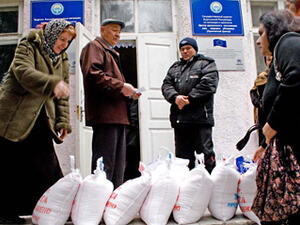UNHCR concerned about Angolan refugees in DR Congo
UNHCR concerned about Angolan refugees in DR Congo

Deputy High Commissioner Wendy Chamberlin visiting Angolan refugees in Kahemba, which has been rocked by violence in recent days.
LUANDA, Angola, April 22 (UNHCR) - The UN refugee agency has expressed concern about the security of Angolan refugees in the Democratic Republic of the Congo (DRC) amid recent attacks by Congolese workers expelled from Angola.
UNHCR's Deputy High Commissioner, Wendy Chamberlin, experienced the tensions first-hand on Tuesday, when she travelled to Bandundu province, south of the DRC capital, Kinshasa. Her vehicle had been shaken and banged when she visited Angolan refugees in Napassa refugee site, situated on the main road between the DRC and Angola's diamond mines near the border.
Those responsible were a group of Congolese workers who had recently been expelled from Angola in a nationwide swoop on foreigners working irregularly in diamond mines. The government crackdown, which started in December, has already resulted in the expulsion of tens of thousands of foreigners from Angola.
Apparently, the returning Congolese vented their frustrations on the Angolan refugees in the DRC, who they saw as being privileged for receiving assistance from UNHCR and its partner organisations.
On Tuesday night, the same angry crowd at Napassa refugee site set fire to two houses belonging to non-governmental organisations AIDES and Oxfam. It was also reported on Wednesday that two refugee shelters had been burned down by the expelled Congolese, followed by extensive looting in nearby Kahemba town, where UNHCR's office and guest house are situated.
Congolese armed forces tried to restore order by shooting in the air. Deputy High Commissioner Chamberlin reassured the Angolan refugees on Tuesday that UNHCR would look after them to the best of its abilities: "We have one priority - to care for you, to care for your protection."
The majority of the workers expelled from Angola are men aged between 18 and 30. Their presence is a concern near Napassa, where some 1,500 Angolan refugees, mostly vulnerable, are sheltered.
"The fact that they are targeting an Angola refugee settlement is of course a huge concern for us," said David Lambo, Director of UNHCR's Africa Bureau in Geneva. "These refugees are already bearing the brunt of their own displacement and they should not be subjected to any further distress. UNHCR would hate to see the problem spreading to other refugee settlements."
The UN refugee agency has called for urgent help for the group of expelled Congolese workers in a region where water, food and housing is scarce.
UN agencies in Kinshasa have launched a coordinated effort to quickly deliver essential assistance to the expelled group, who had been thrown out of Angola with minimum notice and arrived in the DRC with next to nothing.
According to the UN office in Kinshasa, their total number could now have reached 65,000, scattered around four DRC provinces bordering Angola. The UN office also reported "real violations of human rights, rapes and beatings" on the Congolese workers and their families in Angola.
Although expelled Congolese are not covered by UNHCR's mandate - because they were present as workers and not as refugees in Angola - the agency has already contributed to the inter-agency effort by providing two trucks to help transport them back to their areas of origin in the DRC, mostly Kikwit, in Bandundu province, some 400 km away from Kahemba; and Tshikapa in Kasai Occidental province.
The situation was reported to be calm in Kahemba on Thursday.
Deputy High Commissioner Chamberlin has completed the DRC leg of her six-day mission to the region. She arrived in the Angolan capital of Luanda on Thursday morning.
On Friday she is scheduled to meet various government officials in the capital before travelling to Lumbala N'Guimbo, in Angola's Moxico province, on Saturday to visit returnees in the transit centre and assess the situation of returnees in Angola's rural areas, largely destroyed by war. She will head back to Geneva later that evening.









